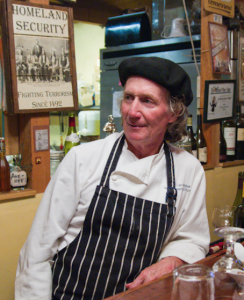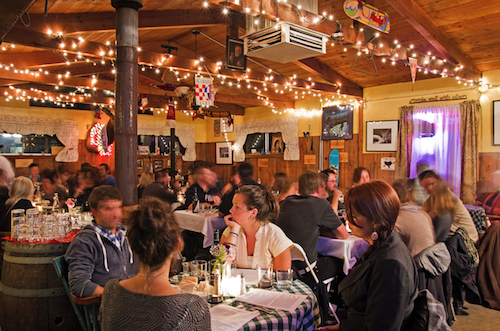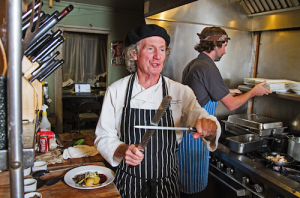 October 18, 2016 – Beginning next Monday October 24, the beloved Cachagua General Store will move its legendary Monday night dinners from deep in upper Carmel Valley to Lokal Restaurant in Carmel Valley Village.
October 18, 2016 – Beginning next Monday October 24, the beloved Cachagua General Store will move its legendary Monday night dinners from deep in upper Carmel Valley to Lokal Restaurant in Carmel Valley Village.
“It won’t be the Cachagua store and it won’t be Lokal and we’re completely comfortable with the schizophrenia of that,” said Michael Jones, the operator of both Cachagua’s actual general store and its unique weekly culinary extravaganzas at the same location. “Basically we’re doing a scheduled popup every Monday.”
“There will still be two distinct restaurants as we have two different philosophies,” Jones elaborated, referring to his son Brendan, who has won acclaim for his own restaurant, Lokal, modestly adding, “Brendan’s more visual, technical and creative. We’re more comfort food I think—osso bucco, stews and steaks.”
The news that the CGS would be closing led to a stream of sad posts on the elder Jones’ Facebook page over the weekend and, in fact, there is no way the new iteration will be quite the same: Lokal is a sunny space, contemporary in its spare decor, and situated in a tame, quaint village.

CGS, on the other hand, as Edible Monterey Bay described in our inaugural issue five years ago (read story here), was set a world away, 25 minutes into the hills of Carmel Valley, where wineries, trailer parks and enclaves of fancy homes thrive off the grid.
Inside the store, Cachagua residents from all walks of life and foodies from as far away as San Francisco dined under taxidermy, twinkly lights and curtains whimsically hand-drawn on butcher paper by Jones’ designer wife, Amanda Girard Jones. At tables outside, squawking wild chickens in the trees overhead contributed to the festive atmosphere.
But the real draw was the food. Jones and his team of cooks from A Moveable Feast—the catering company he ran out the store—normally confined by the safe wishes of wedding planners, let their creativity rip each Monday, creating an epic menu of dozens of creative dishes that would have been at home on a big city fine dining menu, but at CGS were prepared with local ingredients, some grown right in the Cachagua area.

The creators enjoyed it just as much as the guests, and it lasted 13 years.
But this year, during the critical summer season when CGS typically makes 75% of its annual income, Jones says a local press report about a dispute with his landlord and the Soberanes fire combined to make residents think CGS was closed. Business fell by half and, he decided, he could no longer afford to keep the place open.
His deepest regret is for the immediate community in Cachagua, which the restaurant and especially the actual general store served. Jones says only the beer and propane companies made the trip out to deliver, so he personally stocked its shelves with water and food from trips to Costco. Not to mention the fundraisers the CGS organized for residents in need, and the food Jones always prepared for the fire fighters.
Jones is concerned that residents won’t be served now that CGS is empty. But he’s reconciled himself to the fact he could no longer afford to run the store and restaurant in Cachagua and he’s looking ahead.
“It was a work of performance art and it was great,” Jones says. “Now let’s do something else.”
About the author
SARAH WOOD—founding editor and publisher of Edible Monterey Bay—has had a life-long passion for food, cooking, people and our planet.
She planted her first organic garden and cared for her first chicken when she was in elementary school in a farming region of Upstate New York.
Wood spent the early part of her career based in Ottawa, Canada, working in international development and international education. After considering culinary school, she opted to pursue her loves for writing, learning about the world and helping make it a better place by obtaining a fellowship and an MA in Journalism from New York University.
While working for a daily newspaper in New Jersey, she wrote stories that helped farmers fend off development and won a state-wide public service award from the New Jersey Press Association for an investigative series of articles about a slumlord who had hoodwinked ratings agencies and investment banks into propping him up with some early commercial mortgage securitizations. The series led Wood to spend several years in financial journalism, most recently, as editor-in-chief of the leading magazine covering the U.S. hedge-fund industry.
Wood now lives with her family in Washington, DC, where she is a freelance writer and manages communications for Samaritan Ministry, an antipoverty and antiracist nonprofit that provides struggling Greater Washington residents with highly personalized and compassionate life counseling and coaching.
- Sarah Woodhttps://www.ediblemontereybay.com/author/swood/
- Sarah Woodhttps://www.ediblemontereybay.com/author/swood/
- Sarah Woodhttps://www.ediblemontereybay.com/author/swood/
- Sarah Woodhttps://www.ediblemontereybay.com/author/swood/



